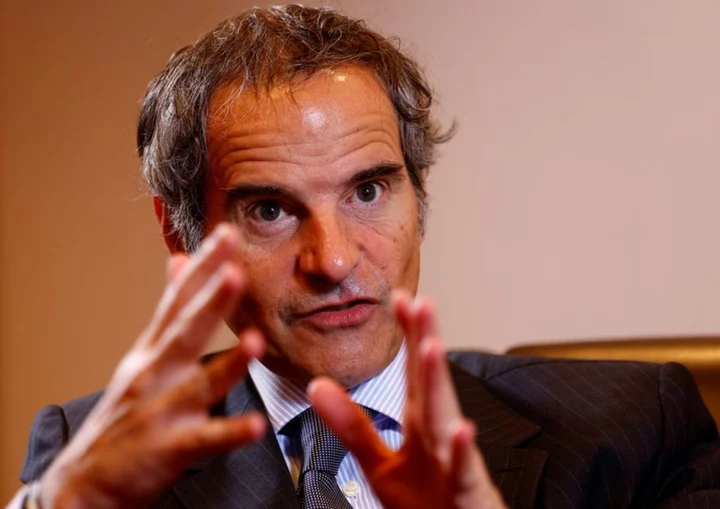By Sakura Murakami and John Geddie
TOKYO (Reuters) -The head of the U.N.'s nuclear watchdog said on Friday he was aware that one or two experts behind the report greenlighting Japan's release of treated radioactive water from the crippled Fukushima plant may have had concerns.
"There have been some ideas to the effect that one or two experts would have been against (the report)," Rafael Grossi told Reuters in his first interview since vouching for the safety of a plan that has faced criticism at home and abroad.
Asked to clarify whether there was concern among any experts behind the report, which included participants from 11 countries including China, the fiercest critic of Japan's plan, Grossi added: "I heard that being said ... but again, what we have published is scientifically impeccable."
Grossi said none of the experts had raised concerns with him directly and he did not elaborate on how he had heard of the issue.
China's state-run Global Times newspaper on Thursday said Liu Senlin, a Chinese expert in the IAEA's technical working group, was disappointed with the "hasty" report and had said the input from experts was limited and only used for reference.
Liu did not immediately respond to a request for comment.
The taskforce established by the IAEA in 2021 to review the safety of Japan's plan to release some 500 Olympic size swimming pools worth of water from the plant wrecked by a tsunami more than a decade ago, also include members from Argentina, Australia, Canada, France, Marshall Islands, South Korea, Russia, Britain, the U.S. and Vietnam, according to the watchdog.
At a later press conference, Grossi said the report was not formed by consensus and that the group of scientific experts and advisers consulted "may or may not have individual opinions".
Asked whether the experts were satisfied with the content of the report, Grossi said: "Absolutely, yes. If there's someone that's not, they should say it."
'NOT ENDORSEMENT'
Beijing has blasted the IAEA's report saying the body should not be endorsing a plan which poses risks to marine life and human health, despite assurances from Japan and the IAEA that it will have a negligible environmental impact.
Grossi said the IAEA's report did not amount to an endorsement of the plan and that Tokyo must take the final decision to release the water due to start later this summer.
"We do not endorse the plan or recommend this to be done. We say this plan is consistent with the standards," Grossi said.
"We do not take sides. I'm not on the side of Japan or on the side of China or on the side of Korea. The standards apply to all the same way," he added.
Some Japanese officials are worried that China, the biggest buyer of its seafood exports, may halt purchases of those items after Tokyo begins the water discharge, expected to take up to 40 years to complete.
China said on Friday it will tighten its scrutiny of food imports from Japan due to safety concerns.
South Korea, which has previously expressed concerns about the release, said on Friday Japan's plans met global safety standards and it respected the IAEA's review.
Before the water is released into the ocean, Japan says it will be filtered to remove most radioactive elements except for tritium, an isotope of hydrogen that is difficult to separate from water. The treated water will then be diluted to well below internationally approved levels, Japan says.
Grossi said given the low levels of radionuclides in the water to be released, they may be indiscernible a few miles from Japan's coast.
"It could be the case that there's no transboundary effect at all," he said.
But as well as varying degrees of international criticism, the plan has also met resistance at home, especially among the fishing community concerned about demand for their produce.
Grossi said he understood the concerns because "nothing identical" to this release had happened before. He added, however, there were also "certain political agendas" attached to criticisms of the plan, without elaborating.
(Reporting by Sakura Murakami and John Geddie in Tokyo; Additional reporting by Martin Pollard in Beijing; Editing by Jacqueline Wong and Michael Perry)

